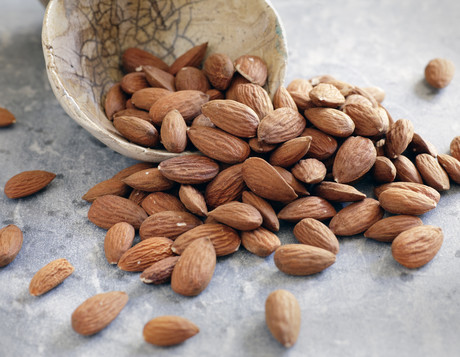Eating almonds could increase good cholesterol

Regularly eating almonds could boost levels of HDL cholesterol while also improving the way it removes cholesterol from the body, according to a new study.
Building on previous research on the effects of almonds on cholesterol-lowering diets, Claire Berryman, Jennifer Fleming and Penny Kris-Etherton compared the levels and function of high-density lipoprotein (HDL cholesterol) in people who ate almonds every day to those who ate a muffin instead. They found that the almond diet improved participants’ HDL levels and functionality.
Previous research has suggested that almonds lower LDL cholesterol, which is a major risk of heart disease, but little is known about how they affect HDL cholesterol levels. Published in The Journal of Nutrition, Kris-Etherton, Professor of Nutrition at Penn State, said the study aimed to reveal whether almonds could improve the function of HDL cholesterol.
“HDL is very small when it gets released into circulation. It’s like a garbage bag that slowly gets bigger and more spherical as it gathers cholesterol from cells and tissues before depositing them in the liver to be broken down,” she explained.
Depending on how much cholesterol it has collected, HDL cholesterol is categorised into five ‘subpopulations’, ranging from the very small preβ-1 to the larger, more mature α-1. The researchers hoped that eating almonds would lead to more α-1 particles, which would indicate improved HDL function.
During two six-week diet periods, researchers controlled the food intake of 48 participants with elevated LDL cholesterol. Both diets were identical apart from the snack, which was either 43 g of almonds or a banana muffin.
The study found that the almond diet increased the α-1 HDL subpopulation (when the particles are at their largest, mature stage) by 19% and improved HDL function by 6.4% in participants of normal weight.
“We were able to show that there were more larger particles in response to consuming the almonds compared to not consuming almonds,” Kris-Etherton said. “That would translate to the smaller particles doing what they’re supposed to be doing. They’re going to tissues and pulling out cholesterol, getting bigger and taking that cholesterol to the liver for removal from the body.”
While almonds will not eliminate the risk of heart disease, Kris-Etherton suggested these particles have been shown to decrease the overall risk and they provide a dose of good fats, vitamin E and fibre.
“If people incorporate almonds into their diet, they should expect multiple benefits, including ones that can improve heart health,” she said. “They’re not a cure-all, but when eaten in moderation — and especially when eaten instead of a food of lower nutritional value — they’re a great addition to an already healthy diet.”
Career upskilling: from food to product development chef
Former chef Zach Baudinet decided to take his years of food experience to the next level through...
A taste of flavours on trend in 2024
Understanding the flavours, ingredients and trends that will shape what we consume is essential...
What's new on the shelf this Easter?
Paper artwork-inspired chocolate eggs, sweet chilli products on show and bite-sized Polly Waffles...












